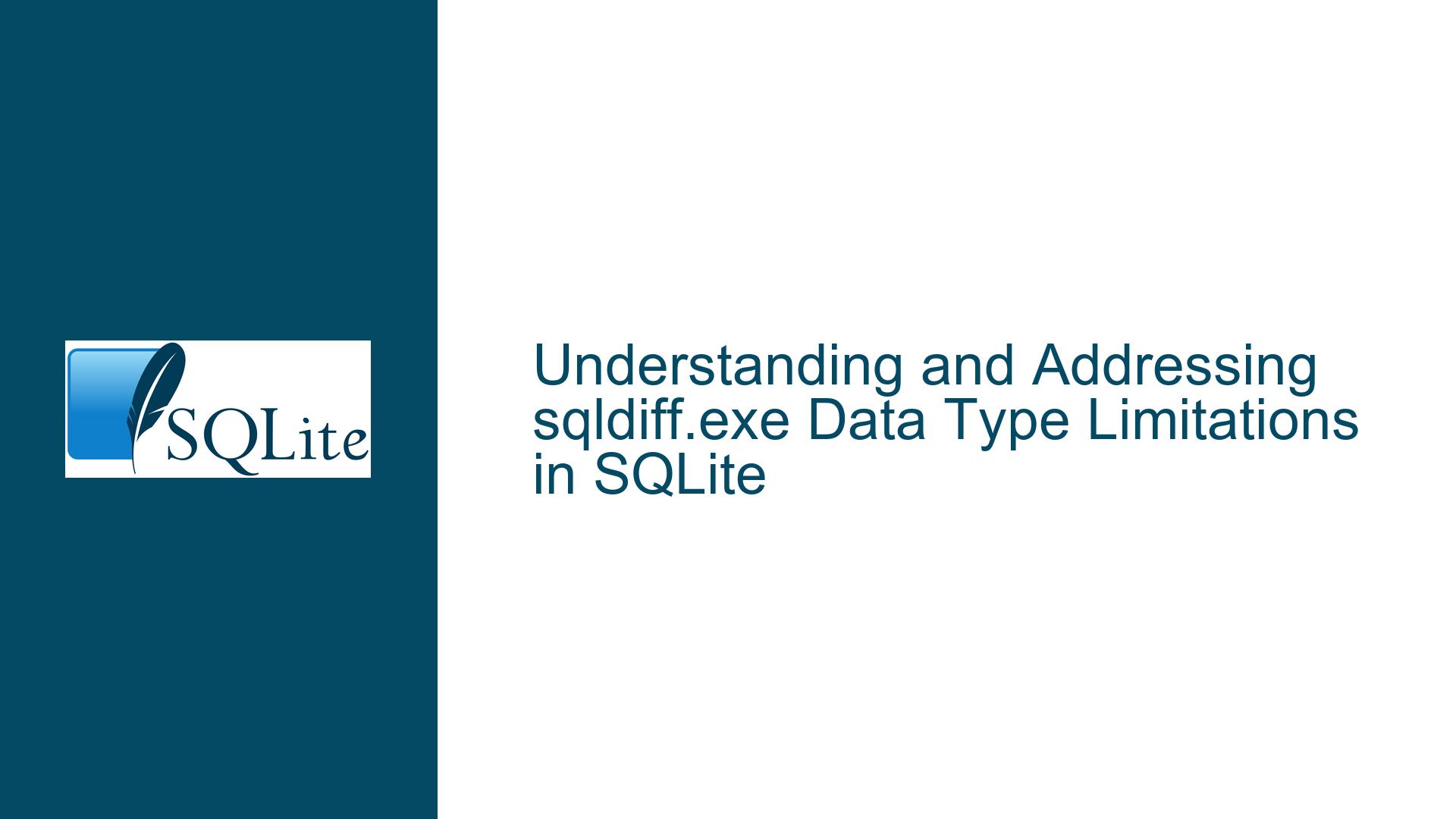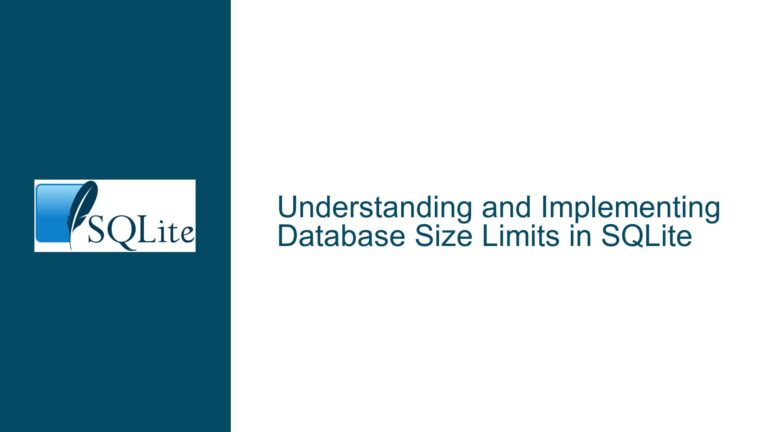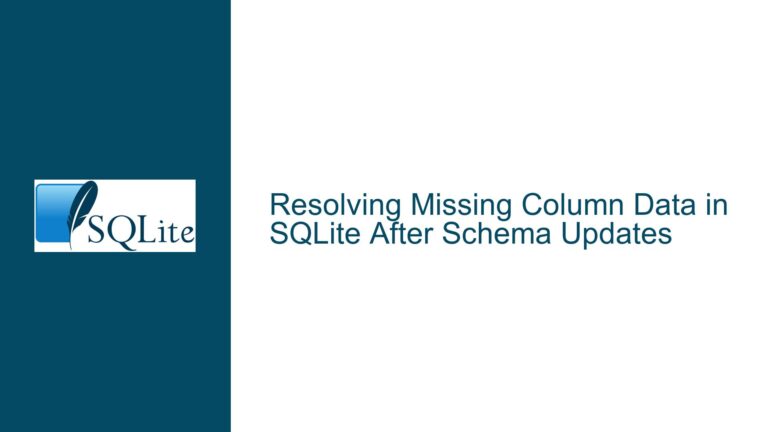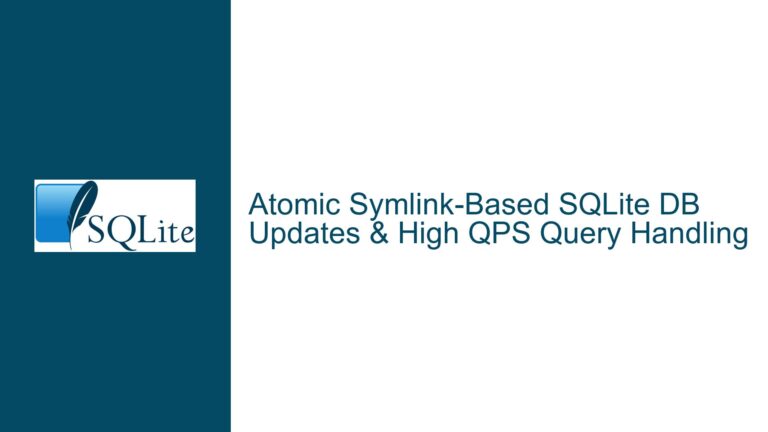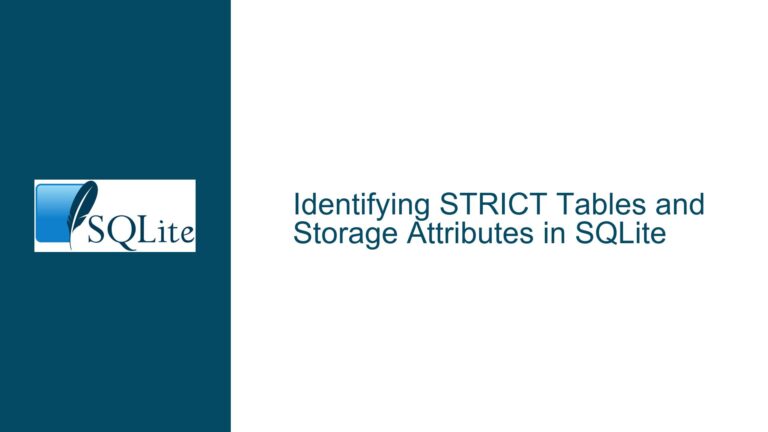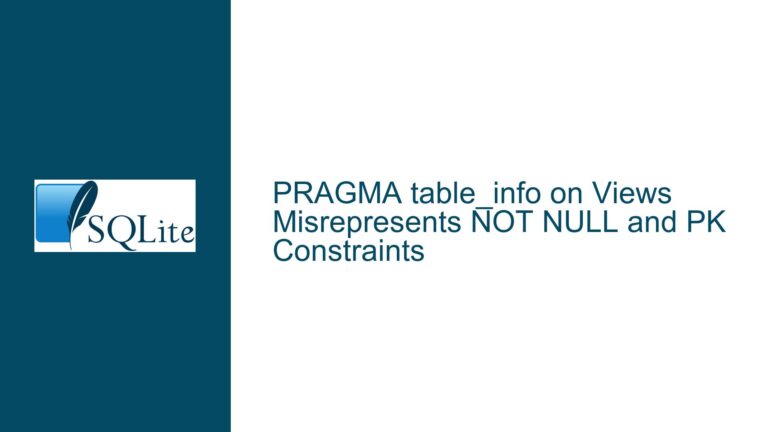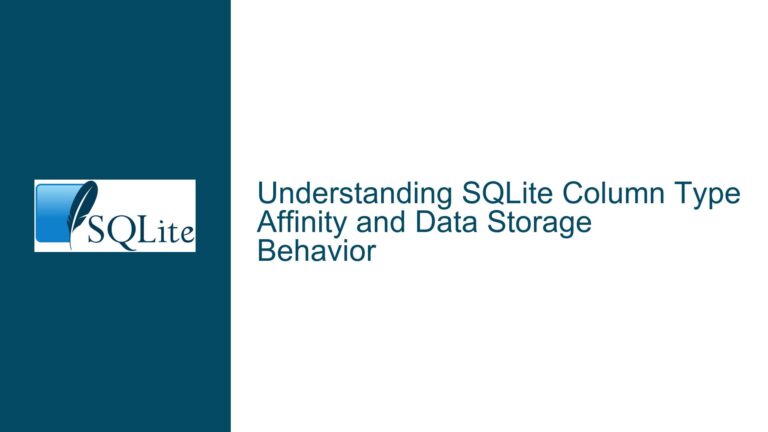and Addressing sqldiff.exe Data Type Limitations in SQLite
Issue Overview: sqldiff.exe Fails to Handle Data Type Differences in Schema Comparisons
The core issue revolves around the behavior of sqldiff.exe, a utility provided by SQLite for comparing databases. Specifically, the utility fails to account for differences in data types when generating schema migration scripts, particularly when the --schema option is used. This limitation becomes especially problematic when working with STRICT tables, where data type enforcement is critical.
When comparing two databases, sqldiff.exe generates an ALTER TABLE statement to add a missing column but omits the data type specification for the new column. This omission leads to errors when the generated SQL is executed against a STRICT table, as SQLite requires explicit data type definitions for all columns in such tables. For example, if test.db contains a table test with a single column text TEXT, and test2.db contains the same table with an additional column count INTEGER, sqldiff.exe generates the following output:
ALTER TABLE test ADD COLUMN count;
This statement lacks the INTEGER data type specification, causing an error when executed against a STRICT table:
Error: stepping, error in table test after add column: missing datatype for test.count
The issue highlights a significant gap in sqldiff.exe‘s functionality, as it does not fully support schema migrations, particularly in environments where strict data type enforcement is required. This limitation is not explicitly documented, leading to confusion and errors for users relying on the utility for schema comparisons.
Possible Causes: Why sqldiff.exe Omits Data Types in Schema Comparisons
The omission of data types in sqldiff.exe‘s output can be attributed to several factors, ranging from design decisions to technical limitations. Understanding these causes is essential for diagnosing the issue and exploring potential solutions.
1. Design Focus on Data Differences, Not Schema Migrations
The primary purpose of sqldiff.exe is to identify differences in data between two SQLite databases, not to facilitate schema migrations. The utility is optimized for generating SQL scripts that synchronize data, such as INSERT, UPDATE, and DELETE statements. Schema differences are treated as a secondary concern, and the utility does not fully account for the complexities of schema migrations, such as data type specifications, constraints, or indexes.
2. Lack of Support for STRICT Tables
STRICT tables were introduced in SQLite version 3.37.0 to enforce stricter data type checking. However, sqldiff.exe does not appear to have been updated to fully support this feature. When generating ALTER TABLE statements, the utility does not include data type information, which is required for STRICT tables. This oversight suggests that sqldiff.exe was not designed with STRICT tables in mind, leading to compatibility issues.
3. Simplistic Schema Comparison Logic
The schema comparison logic in sqldiff.exe is relatively simplistic. It identifies missing columns and generates ALTER TABLE statements to add them but does not delve into the details of column definitions, such as data types, default values, or constraints. This approach works for non-STRICT tables, where data type specifications are optional, but fails for STRICT tables, where they are mandatory.
4. Documentation Gaps
The documentation for sqldiff.exe explicitly states that the utility is not designed for schema migrations. However, it does not provide sufficient detail about the limitations of schema comparisons, particularly regarding data types and STRICT tables. This lack of clarity can lead users to assume that sqldiff.exe is more capable than it actually is, resulting in errors and frustration.
Troubleshooting Steps, Solutions & Fixes: Addressing sqldiff.exe’s Data Type Limitations
To address the issue of sqldiff.exe omitting data types in schema comparisons, several approaches can be taken, ranging from workarounds to potential enhancements of the utility itself. Below, we explore these options in detail.
1. Manual Adjustment of Generated SQL
One immediate workaround is to manually adjust the SQL generated by sqldiff.exe to include the necessary data type specifications. For example, if the utility generates the following statement:
ALTER TABLE test ADD COLUMN count;
You can manually modify it to include the INTEGER data type:
ALTER TABLE test ADD COLUMN count INTEGER;
This approach is straightforward but requires manual intervention, which may not be feasible for large or complex schemas.
2. Use a Custom Script to Enhance sqldiff.exe Output
Another approach is to create a custom script that processes the output of sqldiff.exe and adds the missing data type information. This script can parse the schema of the target database to determine the correct data types for new columns and modify the generated SQL accordingly. For example, a Python script could use the sqlite3 module to query the schema of the target database and update the ALTER TABLE statements.
import sqlite3
def enhance_sqldiff_output(diff_output, target_db):
conn = sqlite3.connect(target_db)
cursor = conn.cursor()
enhanced_output = []
for line in diff_output.splitlines():
if line.startswith("ALTER TABLE") and "ADD COLUMN" in line:
table_name = line.split()[2]
column_name = line.split()[5]
cursor.execute(f"PRAGMA table_info({table_name})")
columns = cursor.fetchall()
for column in columns:
if column[1] == column_name:
data_type = column[2]
enhanced_line = f"{line} {data_type};"
enhanced_output.append(enhanced_line)
break
else:
enhanced_output.append(line)
conn.close()
return "\n".join(enhanced_output)
# Example usage
diff_output = """ALTER TABLE test ADD COLUMN count;"""
target_db = "test2.db"
enhanced_output = enhance_sqldiff_output(diff_output, target_db)
print(enhanced_output)
This script enhances the output of sqldiff.exe by adding the correct data types for new columns, making it compatible with STRICT tables.
3. Modify sqldiff.exe Source Code
For users comfortable with C programming, another option is to modify the source code of sqldiff.exe to include data type information in the generated SQL. The utility is part of the SQLite source distribution, and its code can be found in the tool/sqldiff.c file. By updating the logic that generates ALTER TABLE statements, you can ensure that data types are included.
For example, you could modify the diff_one_table function to include data type information when generating ALTER TABLE statements. This would require parsing the schema of the target table and extracting the data types for new columns.
// Example modification to include data types in ALTER TABLE statements
void diff_one_table(...) {
// Existing logic to identify new columns
if (is_new_column) {
// Fetch data type from target schema
const char *data_type = get_column_data_type(target_db, table_name, column_name);
// Generate ALTER TABLE statement with data type
printf("ALTER TABLE %s ADD COLUMN %s %s;\n", table_name, column_name, data_type);
}
}
This approach provides a more permanent solution but requires familiarity with the SQLite codebase and C programming.
4. Use Alternative Tools for Schema Migrations
Given the limitations of sqldiff.exe, it may be worth considering alternative tools for schema migrations. Several third-party tools and libraries offer more robust support for schema comparisons and migrations, including data type handling. Some popular options include:
- Alembic: A database migration tool for SQLAlchemy that supports SQLite and other databases. It provides detailed control over schema migrations, including data type specifications.
- Flyway: A database migration tool that supports SQLite and other databases. It uses SQL-based migration scripts, allowing for precise control over schema changes.
- Liquibase: Another database migration tool that supports SQLite and other databases. It uses XML, YAML, or JSON to define schema changes, providing flexibility and detailed control.
These tools are designed specifically for schema migrations and offer features that go beyond what sqldiff.exe provides, making them better suited for complex or strict environments.
5. Update Documentation and Raise Awareness
Finally, it is important to update the documentation for sqldiff.exe to clearly state its limitations regarding schema migrations and data type handling. This will help users understand the utility’s capabilities and avoid potential pitfalls. Additionally, raising awareness of this issue within the SQLite community may encourage further development or enhancements to sqldiff.exe to better support STRICT tables and schema migrations.
Conclusion
The issue of sqldiff.exe omitting data types in schema comparisons highlights the importance of understanding the limitations of tools and choosing the right tool for the job. While sqldiff.exe is a valuable utility for comparing data between SQLite databases, it is not designed for schema migrations, particularly in environments with STRICT tables. By employing workarounds, enhancing the utility, or using alternative tools, users can overcome these limitations and achieve their desired outcomes. Additionally, updating documentation and raising awareness of this issue will help prevent future confusion and errors.
